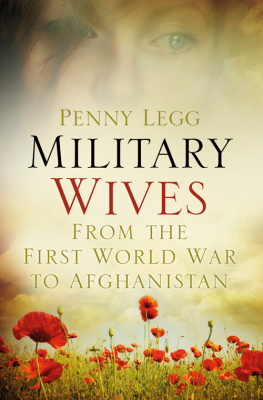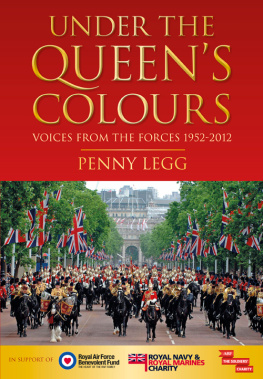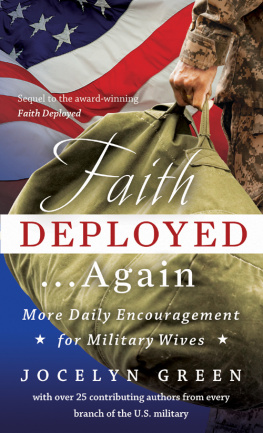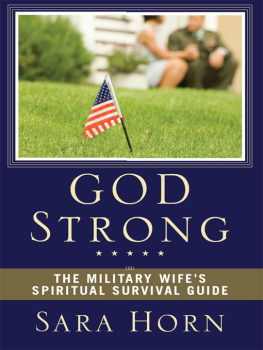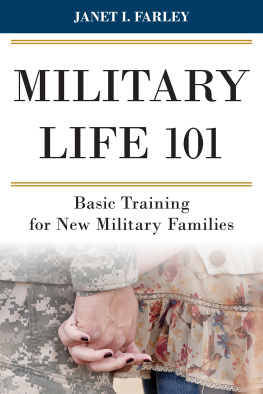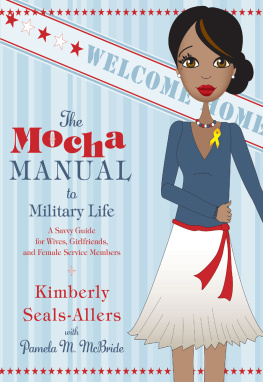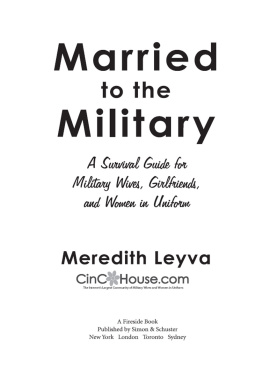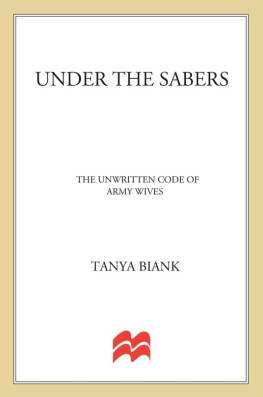
For the unsung heroines, the military wives, and for Joe, Royal Navy Falklands veteran, my hero.
Time dims even the sharpest memory. Please bear with the storyteller if some of the details in these tales are not quite as posterity has recorded them.
With a book like this it is very difficult to know where to start when it comes to saying thank you. So many people have helped me along the way and I hope I have remembered everyone. If I have missed anyone, please accept my apologies and sincere thanks.
Firstly, I must thank Sophie Bradshaw, general history & gift publisher and my commissioning editor, and Jo De Vries, senior commissioning editor at The History Press.
I couldnt have written this book without Jay Armstrong, Caroline, Lady Richards, Carol Backhouse, Jo Ball, Lauren Bray, Kate Churchward, Gladys Curtis, Laura Delahay, Gail Douglas, Anthea Fillingham, Alis Glencross, Joy Hale, Sarah Hattingh, Barbara Hill, Phyllis Holroyd, Steffi Hughes, Fiona Jameson, Phyllida Joel, Sarah Kiff, Nicola Laing, Jade Leahy, Olive Leahy, Helen Malcolmson, Kelly Malster, Lorraine Matthews, Carol Musgrove, Irene Noyce, Margherita Rita Woosnam, Liesel Parkinson, Sue Piper, Dr Jean Powell, Dr Clare Shaw, June Stead, Jean Weeks, Charlotte Woolrich and Kay Wylie. Thank you for the super chats, lovely coffee and cake and, above all, for trusting me with your stories.
I am indebted to Susanne Dawson for allowing me to use her mother Roses story in this book, and for her help with admin during the production of this book.
With kind appreciation to: Maianna Moreau and Jenny Cuffe for allowing the use of material produced for the book, This is my Home Now ; Iris Mardon, for allowing me to delve into her mother, Winifred Deahls, wartime diary; Mike and Gill Holloway, for their continuing help and support; Jay Armstrong ( www.jayarmstrong.co.uk ) for permission to use the photograph of Kate Churchward and her family; James Marsh and the Marsh family for permission to use Edith Marshs Second World War experiences; Pam Whittington, for the use of her poetry in this book, and for her valued friendship; Christopher and Eve Leahy, for not giving up the search and bringing me Lily Hannahs story; Wendi Friend, for excellent research and dogged determination; Roy and Lynn Lambeth, for allowing the Winter family First World War history to be told in this book; Eon Matthews, for his continuing staunch support and friendship. It is appreciated.
With grateful thanks to: Pauline and Simon Weeks, and Trish Simpson, for their help and assistance; John and June Curtis, for their support of this project; Ron Stead for encouragement and enthusiasm; Nicola Donoghue, for her admin support and long-distance assistance; Sarah Gomes, online officer at Charnwood LV ( www.leicestershirevillages.com ) for her assistance in making contact with a local photographer and Peter Smith, photographer, for permission to use his Anstey Church images. Thanks also to Dom, aka Bad CO, at www.rearparty.co.uk , Facebook friends who pointed the way when I got stuck, and Pip Legg, my four-legged old friend, who sleeps peacefully on my desk while I work.
Last as ever, but by no means least, my husband Joe, for being there.
C ONTENTS
I am delighted and honoured to be asked to write the Foreword to Military Wives: From the First World War to Afghanistan. For too long the role of the military wife has been largely overlooked and misunderstood. Penny Legg, a naval wife, has taken up the challenge of researching the lives of military wives. She narrates their story through their own words: through the personal accounts of those who have lived and breathed the life. It is a fascinating and compelling read. I hope it leads to them receiving the recognition in Whitehall that good regiments, ships and air stations have always instinctively accorded them.
Few in society give much thought to the wife of a serviceman. Yet her role can be described as having operational importance; if the wife and family of the serviceman deployed overseas are well cared for and happy, the better he can concentrate on the task in hand. In 1885, Sir James Gildea, the founder of SSAFA wrote to The Times on behalf of the wives and children of those on active service so they are not altogether forgotten, or that the cry of poverty and want be not added to that of suspense and anxiety.
Perhaps the words suspense and anxiety sum up why military wives deserve our respect and gratitude. Yet too often, in awe of the chain of command, wives lack confidence and fear stepping out of line. Indeed, they are often discouraged from voicing their anxieties. As mentioned in these pages, the inspirational Military Wives Choir has helped lift their self-esteem and has quite literally given wives a voice. For this reason I highly recommend this book which records the extraordinary lives of our brave and resilient military wives. In a world of emails and text messages this book leaves an important and lasting legacy; a tribute to the wives of our Armed Forces. As my husband would say, the indomitable spirit of Lady Sale lives on!
Caroline, Lady Richards
Wife of General Sir David Richards and the founder of the Afghan Appeal Fund: afghanappealfund.org.uk
In 2011, I had the good fortune to be commissioned to produce a project I had been nurturing for some time namely to save for posterity the experiences of British and Commonwealth military personnel who had all served Her Majesty Queen Elizabeth II in the sixty years of her reign. Under The Queens Colours was the result, published in time for Her Majestys diamond jubilee. The book raises funds for three service charities and was a lot of fun, if hard work, to put together. I got to meet many good people, hear about their experiences, laugh, cry and sigh with them. I was very grateful for the trust that these servicemen and women placed in me when they supported the project and it was a real privilege to get to know them.
When I was approached by my publisher and asked if I would like to produce a sequel, but this time looking at the experiences of the women married to the men in the military uniforms, I had no hesitation. I looked forward to hearing the opposite side of the coin, the womens story, which is so seldom heard. This book is the result. To produce it, I spoke to a number of ladies, all of whom had one thing in common they were married to men in the British armed services at one time in their lives. I, too, was once a military spouse and I knew that there were stories to be told.
Marrying, or in this day and age, partnering, a member of Her Majestys Armed Forces is not something that is undertaken lightly. Throughout history, it is the service personnel who put their lives at risk for monarch and country, and their loved ones who are left behind, to wait, hope and worry until they come back. If they dont return, life is never the same.
This book takes us back briefly to the First World War, when many women became fiances but never wives. Their men were lost in a vicious war the like of which, it was hoped, would never be seen again. It was the war to end all wars and it took its toll on the British male military population, many of whom were conscripts.
Through the 1920s and 1930s women came to terms with their menfolk in peacetime military service, which sometimes brought its own problems, particularly as long separations, often for years at a time, were the norm.
Then came the Second World War, the war that struck terror into the hearts of all those who remembered the horrors of 191418. Gas masks, mass call-ups, women taking their mens places and make-do-and-mend were the order of the day.
Next page
